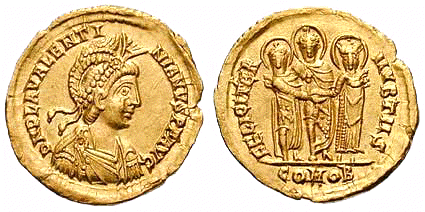Valentinian III. 425-455 AD. AV Solidus (4.42
gm) used to celebrate the marriage of Western Emperor Valentinian III to
Licinia Eudoxia, daughter of the Theodosius II. On the reverse, the three of
them in wedding dress. D N PLA VALENTI [space]
NIANVS P F AVG, diademed and helmeted, draped and cuirassed bust right
FELICITER NVBTIIS, wedding scene with
Theodosius II standing facing in center, his hands of the shoulders of
Valentinian III and his daughter Licinia Eudoxia; all three nimbate-crowned
and wearing ornate marriage robes; COMOB.
RIC X -; DOCLR -; Depeyrot -. EF. Apparently unpublished. This important coin commemorates the marriage of Valentinian III to Licinia Eudoxia on 29 October 437 AD. The imperial couple spent the winter of 437-438 in Thessalonica, at which time this coin was struck.
CTh.1.4.1
Imp. Constantinus a. ad Maximum praefectum Urbi. Perpetuas prudentium contentiones eruere cupientes Ulpiani ac Pauli in Papinianum notas, qui, dum ingenii laudem sectantur, non tam corrigere eum, quam depravare maluerunt, aboleri praecipimus. Dat. IIII k. oct. Crispo et Constantino conss. (321-324 [321] sept. 28). Since we wish to stop the incessant controversies of the jurists, we command that the Notes of Ulpian and Paul on Papinian be destroyed, since they sought praise for their genius by not wishing to correct Papinian but to debase his thought.
CTh.1.4.2
Idem a. ad Maximum praefectum praetorio. Universa, quae scriptura pauli continentur, recepta auctoritate firmanda sunt et omni veneratione celebranda. Ideoque sententiarum libros plenissima luce et perfectissima elocutione et iustissima iuris ratione succinctos in iudiciis prolatos valere minime dubitatur. Dat. v k. oct. treviris Constantio et Maximo conss. (327 [?] sept. 27). All opinions that are contained in the writings of Paul, if they have been accepted by authority (auctoritas), shall be confirmed and shall be celebrated with all respect. Therefore, there is not the least doubt that his Books of Sentences, that embodies marvelous clarity and perfect style and the most just reason of law are valid when his opinions are cited in court.
CTh.1.4.3 [=brev.1.4.1]
Impp. Theodosius et Valentinianus aa. ad senatum urbis Romae. Post alia: Papiniani, Pauli, Gaii, Ulpiani atque Modestini scripta universa firmamus ita, ut Gaium quae Paulum, Ulpianum et cunctos comitetur auctoritas, lectionesque ex omni eius opere recitentur. Eorum quoque scientiam, quorum tractatus atque sententias praedicti omnes suis operibus miscuerunt, ratam esse censemus, ut Scaevolae, Sabini, Iuliani atque Marcelli, omniumque, quos illi celebrarunt, si tamen eorum libri, propter antiquitatis incertum, codicum collatione firmentur. Ubi autem diversae sententiae proferuntur, potior numerus vincat auctorum, vel, si numerus aequalis sit, eius partis praecedat auctoritas, in qua excellentis ingenii vir Papinianus emineat, qui, ut singulos vincit, ita cedit duobus. Notas etiam Pauli atque Ulpiani in Papiniani corpus factas, sicut dudum statutum est, praecipimus infirmari. Ubi autem pares eorum sententiae recitantur, quorum par censetur auctoritas, quod sequi debeat, eligat moderatio iudicantis. Pauli quoque sententias semper valere praecipimus etc. Dat. VIII. id. nov. Ravenna, dd. nn. Theodosius XII. et Valentinianus ii. aa. coss.
We confirm all the writings of Papinian, Paul, Gaius, Ulpian, and Modestinus, so that these jurists shall have same authority, i.e. Gaius as Paul, Ulpian and the others. Gaius' entire body of works may be cited. We also hold valid the opinions of the jurists that they cite in their works, such as Scaevola, Sabinus, Julian, and Marcellus, and all others whom they cite. These jurists' books, however, because of their antiquity, must be confirmed with a collation of manuscripts. When conflicting opinions are cited, the greater number of authors shall prevail, or if the numbers should be equal, the authority of that group shall take precedence in which the man of superior genius, Papinian, shall tower over the rest. Papinian's opinion will defeat a single opinion, but it will give way to two. As was formerly decreed, we also ordain that the Notes of Paul and Ulpian on Papinian be invalidated. When the number of opinions on a certain problem are equal and their authority is equal, the measured authority of the judge shall prevail. We order that the Sentences of Paul shall to valid.
Interpretatio. Haec lex ostendit, quorum iuris conditorum sententiae valeant; hoc est, Papiniani, Pauli, Gaii, Ulpiani, Modestini, Scaevolae, Sabini, Iuliani atque Marcelli: quorum si fuerint prolatae diversae sententiae, ubi maior numerus unum senserit, vincat. Quod si forsitan aequalis numerus in utraque parte sit, eius partis praecedat auctoritas, in qua Papinianus cum aequali numero senserit: quia ut singulos Papinianus vincit, ita et cedit duobus. Scaevola, Sabinus, Iulianus atque Marcellus in suis corporibus non inveniuntur, sed in praefatorum opere tenentur inserti. Gregorianum vero et Hermogenianum ideo lex ista praeteriit, quia suis auctoritatibus confirmantur ex lege priore, sub titulo de constitutionibus principum et edictis. Sed ex his omnibus iuris consultoribus, ex Gregoriano, Hermogeniano, Gaio, Papiniano et Paulo, quae necessaria causis praesentium temporum videbantur, elegimus.
Interpretation: This law demonstrates whose opinions from the promulgators of ius shall have authority: that is Papinian, Paul, Gaius, Ulpian, Modestinus, Scaevola, Sabinus, Iulian, and Marcellus. If their opinions diverge, then the majority number shall win. If there is an equal number for each opinion, then the part to which Papinian belongs shall prevail. Papinian conquers another single jurist but is vanquished by two. Scaevola, Sabinus, Julian, and Marcellus are not to be cited from their own works, but from the works of the aforementioned jurists who have incorporated them into their works. This law omits the Gregorianus and Hermogenianus Codes because they are confirmed by their own authority from a prior law, contained in the title Concerning the Constitutions of the Princes. We have chosen all these jurists Gaius, Papinian, and Paul, Codes, Gregorianus and Hermogenianus, and from all these jurisconsults of ius that is necessary for legal cases at the present.
Translations based on Clyde Pharr, The Theodosian Code and Novels and the Sirmondian Constitutions: A Translation with Commentary, Glossary, and Bibliography. The Corpus of Roman Law 1. Princeton: Princeton University Press, 1952.
